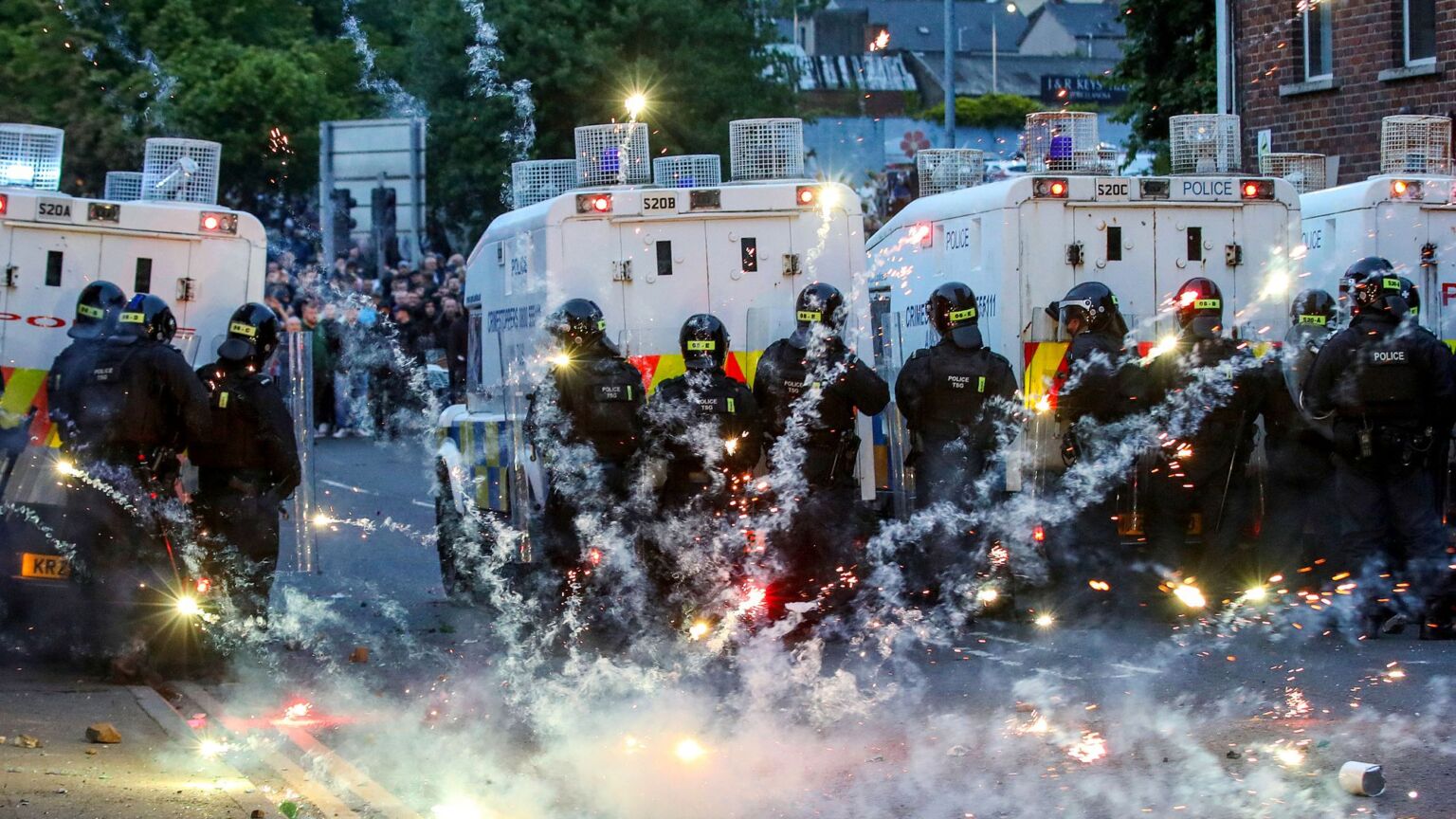Ballymena may be a taste of things to come
We can no longer ignore the simmering tensions in our midst.

Want unlimited, ad-free access? Become a spiked supporter.
Another community in flames. Masonry and Molotov cocktails thrown at police. A leisure centre, believed to be housing migrants, set ablaze by a bigoted mob. Stop me if you think you’ve heard this one before.
This week, Ballymena in County Antrim, Northern Ireland became the latest town within these troubled isles to be ripped apart by fear, loathing and rioting – sparked by an alleged crime committed by migrants.
On Monday, two 14-year-old Romanian Roma boys were charged with attempted oral rape of a teenage girl. The BBC could only bring itself to mention the boys’ background obliquely, noting they ‘confirmed their names and ages through a Romanian interpreter’.
This horrific crime appears to have snapped something, in another working-class community experiencing a heady mix of deindustrialisation, strained resources, crime, mass immigration and fraying social bonds.
A peaceful protest was hijacked by thugs. The town has burned for four nights now. Unrest is breaking out across Northern Ireland, too. The tone has been not just anti-migration, but also violently anti-migrant.
On Monday, rioters attacked the homes of the alleged perpetrators, but also those of other, entirely innocent Roma, who now reportedly make up half of Ballymena’s Clonavon Terrace. The flames soon spread further.
In a nearby village, the home of a Filipino man, totally unconnected to the alleged rape, was firebombed. Heartbreakingly, many of Ballymena’s Filipinos have since fled their homes, leaving signs on their doors saying ‘Filipino lives here’ to ward off the mob.
On Wednesday, rioters started fires and smashed in the windows of a leisure centre in Larne. Word had got out on social media that some of the migrants who moved out of Ballymena were sheltering there.
While this loyalist community has its own particularities – a history of sectarianism and demographic angst. These riots are clearly – chillingly – of a piece with what we’ve witnessed across the UK and Ireland in recent years.
We appear to be caught in an infernal loop. In Knowsley, Merseyside in February 2023, a young girl being propositioned by an asylum seeker sparked a riot outside a migrant hotel. In November that year, trams and cars were set on fire in Dublin after an Algerian national stabbed a woman and three kids outside a school.
In each case, an information vacuum left by the media and officialdom was filled with misinfo and rumour. No more so than after Axel Rudakubana’s barbaric murder of three girls in Southport, when far-right influencers pushed BS online about him being a small-boats migrant, fuelling attacks on mosques and hotels.
And in each case, the nihilistic violence has illuminated deeply troubled communities, in which old industries have disappeared, an influx of cheap labour is barely papering over the cracks, and the local hotel or leisure centre has been turned into asylum accommodation, the state taking advantage of the lower local rates.
Of course none of this justifies the violent racism we have seen burst out on to our streets. Opposition to mass immigration and hatred of immigrants are not one and the same. Ordinary people in Britain and Ireland recognise that our dysfunctional asylum systems are putting citizens in harm’s way, but they do not greet all who come to their nations with suspicion or menace.
Racism is poison. Working-class people know this better than anyone, given they actually live in the diverse communities that commentators only pontificate about. Hatred must be confronted, not rationalised. But to do so we must understand the conditions that have given rise to these new tensions. We must grasp the political, economic and cultural trends that have produced these hollowed-out towns, a growing sense of cultural insecurity, and a growing distrust of what the authorities say, particularly regarding migrants, terrorism and crime.
Losing control of your borders and then expecting impoverished communities to pick up the slack. Imposing mass migration on a public that never asked for it. A multicultural state that sacralises difference over unity, and segregation over integration. A political and media class that has covered up horrific crimes committed by members of certain minority groups, for fear of how those supposedly bigoted whites will react. If you wanted to stir up ethnic conflict, if you wanted to burnish the hateful agendas of the hard right, you’d struggle to find a better playbook than this.
Condemning the racism that has spilled out on to the streets of late is both morally essential and ultimately insufficient. We also need to get at the roots of this disorder, these simmering divides and resentments. Otherwise, Ballymena could be the start of a long, hot summer.
Tom Slater is editor of spiked. Follow him on X: @Tom_Slater
£1 a month for 3 months
You’ve hit your monthly free article limit.
Support spiked and get unlimited access.
Support spiked – £1 a month for 3 months
spiked is funded by readers like you. Only 0.1% of regular readers currently support us. If just 1% did, we could grow our team and step up the fight for free speech and democracy.
Become a spiked supporter and enjoy unlimited, ad-free access, bonus content and exclusive events – while helping to keep independent journalism alive.
———————————————————————————————————————————–
Exclusive January offer: join today for £1 a month for 3 months. Then £5 a month, cancel anytime.
———————————————————————————————————————————–
Monthly support makes the biggest difference. Thank you.











Comments
Want to join the conversation?
Only spiked supporters and patrons, who donate regularly to us, can comment on our articles.